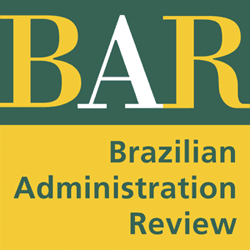Dear BAR readers,
Cheers! In 2014, BAR celebrated 10 years of a successful trajectory disseminating high-quality papers produced by Brazilian researchers and more recently as an attractive venue for publication of management studies from researchers around the world.
We thank the authors, reviewers and editors who have contributed to such achievement. At the end of this editorial, we are publishing the names of the reviewers, ad hoc editors and associate editors who contributed to the journal last year. BAR is very grateful to the insightful contributions they have provided. We also thank our readers for honoring us with their attention and for spreading the word about the journal.
Starting this year, BAR will be published in March, June, September and December. BAR continues to be a quarterly journal and this shift in the publication dates (from previous Jan-Apr-Jul-Oct periodicity) aims at avoiding publication during the Summer period, when our editorial assistant is on vacation, according to ANPAD's recess.
I am pleased to bring to your knowledge six good pieces of academic work.
The first article (Bounded Creativity: Understanding the Restrictions on Creative Work in Advertising Agencies, by Alexandre Romeiro and Thomaz Wood Jr.) investigates an under-researched topic -the organizational restrictions that firms impose on creative work. Findings reveal that creativity is influenced by the tension that originates from the interaction between two dimensions: the search for originality and the need for acceptance. The authors advance the concept of bounded creativity.
The second paper (An Introduction to the 5M Framework: Reframing Change Management Education, by Richard Badham, Vera Cançado and Temi Darief) introduces a reflective and critical rhetorical framework to replace traditional approaches to change management and its education. This framework conceptualizes managing change as the Mindful Mobilizing of Maps, Masks and Mirrors and provides a comprehensive integration of the processual, practice and critical academic literature on change management.
The next piece (The Life Cycle of Small-firm Networks: An Evaluation of Brazilian Business Networks, Douglas Wegner, Rejane Alievi and Heron Begnis) proposes a small-firm networks (SFNs) life cycle model in order to characterize the stage of evolution of business networks.
The fourth article (The Effect of Simultaneous Sponsorship of Rival Football Teams, by João Guilherme de Amorim and Victor de Almeida) explores the impact of team identification and team-sponsor fit on sponsor brand equity. Results suggest that, in the particular context of simultaneous sponsorship of rival teams, a sponsor's brand equity is more strongly influenced by team-sponsor fit than by team identification, which is different from what can be found in a non-rivalry sponsorship context.
Following, we have an article (The Effects of Trust Transference, Mobile Attributes and Enjoyment on Mobile Trust, by Cristiane Giovannini, Jorge Brantes Ferreira, Jorge Ferreira da Silva and Daniel Ferreira) that addresses two under-researched topics - the relationships between mobile devices' unique components of interactivity and customer trust, and the relationship between offline, online and mobile trust. Findings suggest that trust transferred from online contexts and ease of use significantly influence mobile-device trust formation, and that mobile trust influences consumers' attitudes towards and intentions to purchase by using mobile devices.
We close this issue with a paper (Drivers of Environmental Management in the Brazilian Context, by Patricia Berardi and Renata Peregrino de Brito) that investigates the decoupling between policy and practice as regards environmental management. Findings indicate the importance of command and control instruments as well as stakeholder pressure in promoting better environmental practices inside firms; yet, results suggest that voluntary norms do not seem to influence management practices even though they are perceived as a market opportunity.
This month, BAR is initiating the transition to a new editor-in-chief: Prof. Salomão Farias, Federal U. of Pernambuco, Brazil. I will remain as co-editor-in-chief for some months - until all the manuscripts that were assigned to me have been finalized, either as accepted or as rejected. Meanwhile, Salomão will take over the new incoming manuscripts.
My term as editor-in-chief of BAR, since late 2010, has been a period of much learning and maturing. I have really enjoyed the chance to work with experienced reviewers and associate editors in a rewarding quest to help authors improve their manuscripts. The many messages I have received - from authors of accepted as well as of rejected articles and from reviewers and associate editors - serve as testimonial of the high degree of quality that BAR has achieved, both in terms of academic rigor and its expedited review process. I would like to thank our editorial assistant, Luciane Kiwara, whose relentless spirit and passion for high-quality processes have been essential for the continued progress of BAR towards ever higher standards.
I take the chanced to thank Professors Tomas de Aquino and Antonio Carvalho Neto, former Directors of Publications and Communication of ANPAD, who trusted me and always supported me. I also thank Prof. Rogerio Quintella, from whom I "inherited" the editorship of BAR and who always served as an example; now Rogerio occupies the position of Director of Publications and Communication and has asked me to join the Editorial Advisory Board of BAR when I have completely stepped down as editor. It will be my pleasure to continue to serve BAR.
I am sure that Salomão Farias will lead BAR through new challenges and towards new achievements. Our authors, reviewers, editors and readers will continue to see high quality work published in our journal. My warmest welcome to Salomão!
Jorge CarneiroSalomão Alencar de Farias
Publication Dates
-
Publication in this collection
Mar 2015

